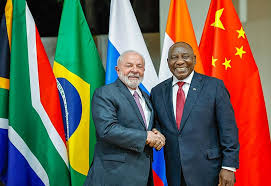Brazil’s Moral Misstep: A Conservative Critique of Its Anti-Israel Stance and Global Implications
By Hotspotorlando News
Brazil’s Moral Misstep: A Conservative Critique of Its Anti-Israel Stance and Global Implications
As of July 25, 2025, the international community finds itself grappling with a troubling development in Brazilian foreign policy. The administration of President Luiz Inácio Lula da Silva has made the audacious decision to join South Africa’s International Court of Justice (ICJ) case accusing Israel of genocide in Gaza, while simultaneously withdrawing from the International Holocaust Remembrance Alliance (IHRA). This dual move, condemned by Israel’s Foreign Ministry as a “profound moral failure,” signals a dangerous shift that threatens not only Brazil’s standing but also its longstanding alliances, particularly with the United States and other democratic nations. From a conservative perspective, this action represents a betrayal of shared values and a reckless alignment with authoritarian regimes, with far-reaching geopolitical consequences.
The Decision and Its Roots
Brazil’s decision to join the ICJ offensive comes at a time when Israel is defending itself against existential threats posed by Hamas and other terrorist entities. The Israeli government argues that it is fighting for survival, a stance rooted in its historical struggle against those who seek its destruction. Yet, Brazil’s move to label this defense as genocide—echoing the rhetoric of nations hostile to Western interests—undermines a key ally in the fight against global terrorism. Coupled with its withdrawal from the IHRA, an organization dedicated to combating antisemitism and preserving Holocaust memory, Brazil appears to be turning its back on a moral consensus forged by democratic societies. This pivot aligns with Lula’s broader foreign policy, which has increasingly favored engagement with non-Western powers like China and Iran, prioritizing ideological posturing over principled alliances.
Critics within Brazil, including conservative voices on social media, assert that this policy does not reflect the will of the people. A recent poll suggests that 66% of Brazilians support Israel, highlighting a stark disconnect between the Lula administration and its citizens. This authoritarian disregard for public opinion—pushing an agenda without consultation—mirrors the tactics of the very dictatorships Brazil now seems to court, further eroding its democratic credibility.
Implications for U.S.-Brazil Relations
The United States, a historical partner of Brazil since recognizing its independence in 1824, will undoubtedly feel the sting of this decision. The U.S. has long viewed Brazil as a regional leader capable of countering instability in Latin America, a role reinforced by decades of friendly diplomatic and economic ties. However, Brazil’s alignment with the ICJ case—seen by many in Washington as a politically motivated attack on a key U.S. ally—threatens to strain this relationship. Conservatives in the U.S. will likely pressure the administration to impose economic sanctions or reduce military cooperation, arguing that Brazil’s actions embolden adversaries like Iran, which supports Hamas. The potential loss of trade benefits or joint defense initiatives could hit Brazil’s economy hard, given its reliance on American markets.
Moreover, this move risks alienating Brazil from other Western democracies, such as Canada and the United Kingdom, which have historically supported Israel’s right to self-defense. The U.S. may rally these nations to form a coalition pressuring Brazil to reconsider, potentially isolating it on the global stage. Such a rift could weaken the Western bloc’s unity at a time when challenges from authoritarian powers—China, Russia, and Iran—demand a cohesive front.’
Global Ripples and the Rise of Authoritarian Influence
Beyond its bilateral impact, Brazil’s decision has broader implications for the global order. By siding with South Africa and implicitly endorsing narratives that equate Israel’s actions with genocide, Brazil lends legitimacy to a bloc of nations that often oppose Western values of freedom and human rights. This shift could encourage other Latin American countries, already swayed by leftist ideologies, to follow suit, creating a domino effect that fractures regional stability. The withdrawal from the IHRA, meanwhile, signals to the world that Brazil is willing to abandon its commitment to combating antisemitism, a stance that could embolden extremist groups across the Americas.
For the United States and its allies, this represents a strategic loss. Brazil’s growing ties with China, evidenced by increased trade and infrastructure deals, suggest it may be positioning itself within a Beijing-led axis, further complicating U.S. efforts to maintain influence in the Western Hemisphere. If Brazil becomes a conduit for Chinese or Iranian interests, it could undermine American security initiatives, such as counterterrorism efforts in the Middle East, where Israel remains a critical partner.
Realignment Needed
From a conservative standpoint, Brazil’s actions are a wake-up call. The U.S. must respond decisively, leveraging diplomatic and economic tools to remind Brazil of the benefits of its traditional alliances. This could include targeted sanctions on Brazilian officials involved in the ICJ decision or incentives for a policy reversal, such as enhanced trade agreements contingent on renewed commitment to democratic values. Simultaneously, American conservatives should support grassroots movements within Brazil that reject Lula’s foreign policy, amplifying the voices of the 66% who stand with Israel.
The implications of Brazil’s moral misstep extend far beyond its borders. It is a test of whether nations can uphold shared principles in the face of ideological pressure. For the U.S. and its allies, the response must be firm yet strategic, ensuring that Brazil’s drift toward authoritarianism does not destabilize the free world. Failure to act could embolden a new axis of power, leaving democracies to pay the price for years to come.
Sources:
– Israel Foreign Ministry press release, July 24, 2025
– Reuters report on Brazil’s ICJ move, July 23, 2025
– Wikipedia entry on Brazilian foreign policy, updated 2025
– Real-time poll data cited on X, July 25, 2025
– Historical U.S.-Brazil diplomatic records
– Wikipedia entry on the International Holocaust Remembrance Alliance, updated 2025


